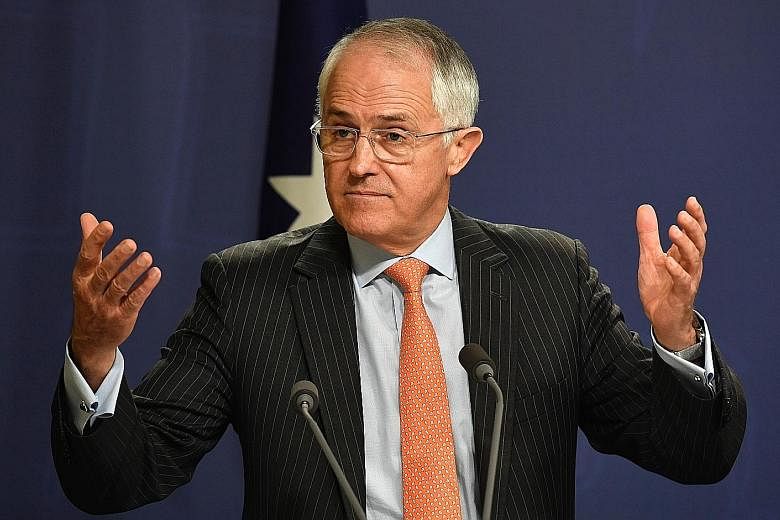Australia's Prime Minister Malcolm Turnbull has accepted full responsibility for his ruling Coalition's dismal election result as further vote-counting indicates the nation is headed for a hung Parliament and an era of political instability.
Ongoing tallying of some three million uncounted votes from Saturday's election suggests that neither the conservative Liberal-National Coalition nor the Labor opposition will gain a majority in the 150-member Lower House.
With about 80 per cent of votes counted, analysis by ABC News last night suggested that the Coalition and the Labor Party were both on track to win 70 seats, with five independents and five seats still in doubt. But some of these seats are on razor-thin margins, suggesting it could take until the weekend or beyond before the final results are known.
Speaking publicly for the first time since Sunday, Mr Turnbull said yesterday that he accepted the blame for the failure of his long eight-week campaign. He accused Labor of unfairly claiming he would weaken the Medicare national healthcare scheme, but he acknowledged that the claim had proved effective and he must do more to understand public concerns.
"There is no doubt that there is a level of disillusionment with politics, with government, and with the major parties, our own included. We have work to do and we are committed to that, that is a very clear lesson," he said.
Labor leader Bill Shorten said yesterday that Mr Turnbull was preparing for a snap second election - a claim Mr Turnbull denied.
"He's got a backbench in revolt," Mr Shorten said. "This is a divided government led by a weak prime minister, so I've got no doubt the easy option for him would be to pull the rip-cord and look at having another election."
Mr Turnbull, who deposed then prime minister Tony Abbott last September, has come under pressure since the election results began to emerge on Saturday night.
Mr Turnbull has faced heavy criticism from supporters of Mr Abbott, who has strong backing among the party's conservative wing. Some senior Liberal Party figures, including former prime minister John Howard, yesterday publicly called on the party to rally behind Mr Turnbull. But most observers believe that Mr Turnbull's standing is severely weakened and that he will struggle to keep his job, even if the Coalition scrapes back into government.
"Facing a hung Parliament, Turnbull would be juggling a bunch of crossbenchers while trying to cope with the critics in his own party, who will become more emboldened and strident," wrote veteran political commentator Michelle Grattan on The Conversation website.
"Members of the right, seeing him wounded, will want to get their way at every opportunity… Turnbull already has had to trade away much of his political persona (to appease the party's right wing) - go much further and he becomes a hollow man."
Some analysts believe a period of political instability could further dampen an already shaky economy.
Adding to the uncertainty, whichever party eventually musters a majority in the Lower House will still have to grapple with a divided Senate and deal with a variety of minor parties and independents.
If the Coalition forms the government, it is expected to struggle to pass the main plank of its long-term plan to grow the economy - A$50 billion (S$50.5 billion) worth of corporate tax cuts. Labor and the minor parties have indicated that they oppose much of the plan.
Ratings agencies have warned that the nation's AAA credit rating could now be at risk, especially if political gridlock makes it impossible to pass Budget measures and address the growing deficit.
"Many potential shocks could come around the corner - slower Chinese economic growth, the housing market that weakens, high household debt pressuring the economy," Mr Mervyn Tang of Fitch Ratings told ABC Radio.
"Should those things happen, and there's no cohesive, coherent policy action, then that will be a problem."

